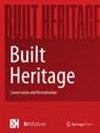Modernist heritage and memory politics in Spain: shifting values for the adaptive reuse of Seville’s former police headquarters
Q1 Arts and Humanities
引用次数: 0
Abstract
The political significance of modernist heritage architecture continues to be an unsolved question, particularly its identification and conservation. In Spain, the chronology of modernism stretches through the whole of the Spanish Civil War and Franco’s dictatorship. The passing of legislation on memory politics in Spain (i.e. the 2007 Law of Historical Memory and the 2022 Law of Democratic Memory) offers a unique opportunity to address this unsolved question by discussing two uncharted heritage debates: namely, the motivations for the heritagisation of modernist architecture in Spain and the challenges in the adaptive reuse of modernist buildings with controversial histories. The former police headquarters in Seville exemplifies the complexities of both debates and to what extent conflicting views about heritage architecture may determine debates about its reuse. Through a documentary review of the heritagisation of Seville’s former police headquarters, a discourse analysis of intervention proposals and press articles and interviews with relevant stakeholders, this study explored how the rise of memory politics in Spain has changed the interpretation of the former police headquarters’ significance in the last two decades and influenced the choices for its adaptive reuse.西班牙的现代主义遗产和记忆政治:塞维利亚前警察总部适应性再利用的价值转变
现代主义遗产建筑的政治意义仍然是一个悬而未决的问题,特别是其识别和保护。在西班牙,现代主义的时间顺序贯穿整个西班牙内战和佛朗哥独裁统治时期。西班牙通过的有关记忆政治的立法(即 2007 年《历史记忆法》和 2022 年《民主记忆法》)为解决这一悬而未决的问题提供了一个独特的机会,可以讨论两个未知的遗产辩论:即西班牙现代主义建筑遗产化的动机以及对具有争议历史的现代主义建筑进行改造再利用所面临的挑战。塞维利亚前警察总部是这两个争论的复杂例子,对遗产建筑的不同看法在多大程度上决定了对其再利用的争论。本研究通过对塞维利亚前警察总部遗产化的文献回顾、对干预建议和新闻报道的话语分析以及对相关利益方的访谈,探讨了西班牙记忆政治的兴起如何在过去二十年中改变了对前警察总部重要性的诠释,并影响了对其改造再利用的选择。
本文章由计算机程序翻译,如有差异,请以英文原文为准。
求助全文
约1分钟内获得全文
求助全文

 求助内容:
求助内容: 应助结果提醒方式:
应助结果提醒方式:


